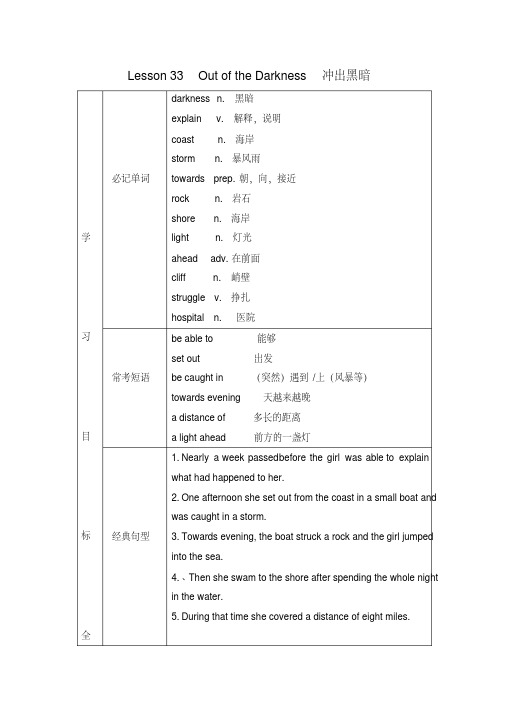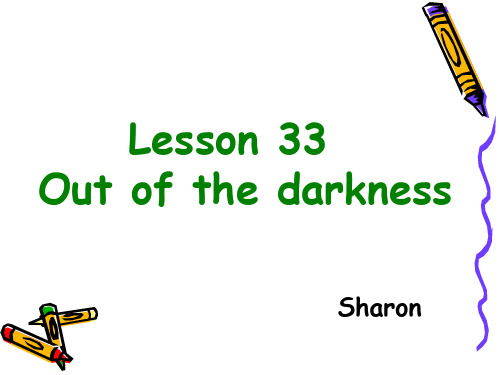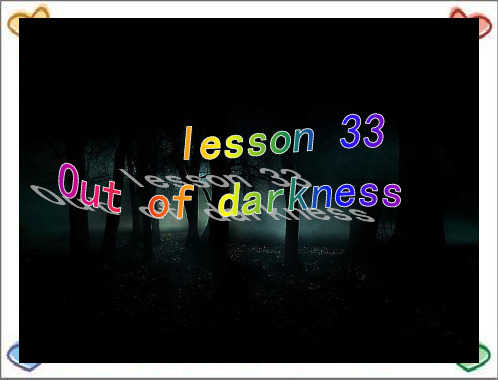新概念第二册一课一练Lesson33
- 格式:doc
- 大小:22.50 KB
- 文档页数:1

Lesson 33 Out of the Darkness 冲出黑暗学习目标全必记单词darkness n. 黑暗explain v. 解释,说明coast n. 海岸storm n. 暴风雨towards prep. 朝,向,接近rock n. 岩石shore n. 海岸light n. 灯光ahead adv. 在前面cliff n. 峭壁struggle v. 挣扎hospital n. 医院常考短语be able to 能够set out 出发be caught in (突然)遇到/上(风暴等)towards evening 天越来越晚a distance of 多长的距离a light ahead 前方的一盏灯经典句型1.Nearly a week passed b efore the girl was able to explainwhat had happened to her.2.One afternoon she set out from the coast in a small boat andwas caught in a storm.3.Towards evening, the boat struck a rock and the girl jumpedinto the sea.4.、Then she swam to the shore after spending the whole nightin the water.5.During that time she covered a distance of eight miles.解重点语法(1) 表示“上、下”的两对小品词是on和off,up和downJim’s standing on the roof. I hope he won’t fall off. Tom’s climbing up the tree. I hope he won’t fall down.(2) 表示“来、去”的一对小品词是from和to;towards(强调越来越近)的意义和to(强调目标)相近,表示“朝,向,接近”等;for 在有些动词后面也表示“往,向”的意思The ball was coming towards me.The plane flies from Moscow to New York.He went for home.leave for… 动身到某地(强调离开,出发)Yesterday my father left for Tianjin.set out for… 动身到某地He left/ set out for New York yesterday.head for/to 前往(强调“去”)(3) 表示“进去,出来”这两种方向的介词为into(进、入)和out of(从...出来);表示“在某个地方”或“在……里面/外面”可用at(含有一种瞄准的概念,方向性),in,out of等;表示目的地或位置往往用ataim at,fire at(瞄准开火),throw at,threw to the bankTell him go into my house.Did you stop anywhere on your way to the office?去办公室的路上你在别的地方逗留过吗?(4) 表示“穿过,越过,绕过”等动词时,往往用through,across,under,over,round等介词How did you get through the fence? 你怎么穿过篱笆的?How did you get over the wall? .2. Pass and Pastpass和past的区别主要是词义上的区别,pass是动词,其解重点语法(1) 表示“上、下”的两对小品词是on和off,up和downJim’s standing on the roof. I hope he won’t fall off. Tom’s climbing up the tree. I hope he won’t fall down.(2) 表示“来、去”的一对小品词是from和to;towards(强调越来越近)的意义和to(强调目标)相近,表示“朝,向,接近”等;for 在有些动词后面也表示“往,向”的意思The ball was coming towards me.The plane flies from Moscow to New York.He went for home.leave for… 动身到某地(强调离开,出发)Yesterday my father left for Tianjin.set out for… 动身到某地He left/ set out for New York yesterday.head for/to 前往(强调“去”)(3) 表示“进去,出来”这两种方向的介词为into(进、入)和out of(从...出来);表示“在某个地方”或“在……里面/外面”可用at(含有一种瞄准的概念,方向性),in,out of等;表示目的地或位置往往用ataim at,fire at(瞄准开火),throw at,threw to the bankTell him go into my house.Did you stop anywhere on your way to the office?去办公室的路上你在别的地方逗留过吗?(4) 表示“穿过,越过,绕过”等动词时,往往用through,across,under,over,round等介词How did you get through the fence? 你怎么穿过篱笆的?How did you get over the wall? .2. Pass and Pastpass和past的区别主要是词义上的区别,pass是动词,其解重点语法(1) 表示“上、下”的两对小品词是on和off,up和downJim’s standing on the roof. I hope he won’t fall off. Tom’s climbing up the tree. I hope he won’t fall down.(2) 表示“来、去”的一对小品词是from和to;towards(强调越来越近)的意义和to(强调目标)相近,表示“朝,向,接近”等;for 在有些动词后面也表示“往,向”的意思The ball was coming towards me.The plane flies from Moscow to New York.He went for home.leave for… 动身到某地(强调离开,出发)Yesterday my father left for Tianjin.set out for… 动身到某地He left/ set out for New York yesterday.head for/to 前往(强调“去”)(3) 表示“进去,出来”这两种方向的介词为into(进、入)和out of(从...出来);表示“在某个地方”或“在……里面/外面”可用at(含有一种瞄准的概念,方向性),in,out of等;表示目的地或位置往往用ataim at,fire at(瞄准开火),throw at,threw to the bankTell him go into my house.Did you stop anywhere on your way to the office?去办公室的路上你在别的地方逗留过吗?(4) 表示“穿过,越过,绕过”等动词时,往往用through,across,under,over,round等介词How did you get through the fence? 你怎么穿过篱笆的?How did you get over the wall? .2. Pass and Pastpass和past的区别主要是词义上的区别,pass是动词,其解重点语法(1) 表示“上、下”的两对小品词是on和off,up和downJim’s standing on the roof. I hope he won’t fall off. Tom’s climbing up the tree. I hope he won’t fall down.(2) 表示“来、去”的一对小品词是from和to;towards(强调越来越近)的意义和to(强调目标)相近,表示“朝,向,接近”等;for 在有些动词后面也表示“往,向”的意思The ball was coming towards me.The plane flies from Moscow to New York.He went for home.leave for… 动身到某地(强调离开,出发)Yesterday my father left for Tianjin.set out for… 动身到某地He left/ set out for New York yesterday.head for/to 前往(强调“去”)(3) 表示“进去,出来”这两种方向的介词为into(进、入)和out of(从...出来);表示“在某个地方”或“在……里面/外面”可用at(含有一种瞄准的概念,方向性),in,out of等;表示目的地或位置往往用ataim at,fire at(瞄准开火),throw at,threw to the bankTell him go into my house.Did you stop anywhere on your way to the office?去办公室的路上你在别的地方逗留过吗?(4) 表示“穿过,越过,绕过”等动词时,往往用through,across,under,over,round等介词How did you get through the fence? 你怎么穿过篱笆的?How did you get over the wall? .2. Pass and Pastpass和past的区别主要是词义上的区别,pass是动词,其解重点语法(1) 表示“上、下”的两对小品词是on和off,up和downJim’s standing on the roof. I hope he won’t fall off. Tom’s climbing up the tree. I hope he won’t fall down.(2) 表示“来、去”的一对小品词是from和to;towards(强调越来越近)的意义和to(强调目标)相近,表示“朝,向,接近”等;for 在有些动词后面也表示“往,向”的意思The ball was coming towards me.The plane flies from Moscow to New York.He went for home.leave for… 动身到某地(强调离开,出发)Yesterday my father left for Tianjin.set out for… 动身到某地He left/ set out for New York yesterday.head for/to 前往(强调“去”)(3) 表示“进去,出来”这两种方向的介词为into(进、入)和out of(从...出来);表示“在某个地方”或“在……里面/外面”可用at(含有一种瞄准的概念,方向性),in,out of等;表示目的地或位置往往用ataim at,fire at(瞄准开火),throw at,threw to the bankTell him go into my house.Did you stop anywhere on your way to the office?去办公室的路上你在别的地方逗留过吗?(4) 表示“穿过,越过,绕过”等动词时,往往用through,across,under,over,round等介词How did you get through the fence? 你怎么穿过篱笆的?How did you get over the wall? .2. Pass and Pastpass和past的区别主要是词义上的区别,pass是动词,其解重点语法(1) 表示“上、下”的两对小品词是on和off,up和downJim’s standing on the roof. I hope he won’t fall off. Tom’s climbing up the tree. I hope he won’t fall down.(2) 表示“来、去”的一对小品词是from和to;towards(强调越来越近)的意义和to(强调目标)相近,表示“朝,向,接近”等;for 在有些动词后面也表示“往,向”的意思The ball was coming towards me.The plane flies from Moscow to New York.He went for home.leave for… 动身到某地(强调离开,出发)Yesterday my father left for Tianjin.set out for… 动身到某地He left/ set out for New York yesterday.head for/to 前往(强调“去”)(3) 表示“进去,出来”这两种方向的介词为into(进、入)和out of(从...出来);表示“在某个地方”或“在……里面/外面”可用at(含有一种瞄准的概念,方向性),in,out of等;表示目的地或位置往往用ataim at,fire at(瞄准开火),throw at,threw to the bankTell him go into my house.Did you stop anywhere on your way to the office?去办公室的路上你在别的地方逗留过吗?(4) 表示“穿过,越过,绕过”等动词时,往往用through,across,under,over,round等介词How did you get through the fence? 你怎么穿过篱笆的?How did you get over the wall? .2. Pass and Pastpass和past的区别主要是词义上的区别,pass是动词,其解重点语法(1) 表示“上、下”的两对小品词是on和off,up和downJim’s standing on the roof. I hope he won’t fall off. Tom’s climbing up the tree. I hope he won’t fall down.(2) 表示“来、去”的一对小品词是from和to;towards(强调越来越近)的意义和to(强调目标)相近,表示“朝,向,接近”等;for 在有些动词后面也表示“往,向”的意思The ball was coming towards me.The plane flies from Moscow to New York.He went for home.leave for… 动身到某地(强调离开,出发)Yesterday my father left for Tianjin.set out for… 动身到某地He left/ set out for New York yesterday.head for/to 前往(强调“去”)(3) 表示“进去,出来”这两种方向的介词为into(进、入)和out of(从...出来);表示“在某个地方”或“在……里面/外面”可用at(含有一种瞄准的概念,方向性),in,out of等;表示目的地或位置往往用ataim at,fire at(瞄准开火),throw at,threw to the bankTell him go into my house.Did you stop anywhere on your way to the office?去办公室的路上你在别的地方逗留过吗?(4) 表示“穿过,越过,绕过”等动词时,往往用through,across,under,over,round等介词How did you get through the fence? 你怎么穿过篱笆的?How did you get over the wall? .2. Pass and Pastpass和past的区别主要是词义上的区别,pass是动词,其。


新概念二Lesson 33 课后练习填空。
1.黑暗2.海岸3.解释,叙述4.灯光5.峭壁6.挣扎7.出发。
动身8.遇上暴风雨9.一到海岸10.游乐8英里课文填空。
Nearly a week passed before the girl was able to what had happened to her. One afternoon she from the coast in a small boat and was . Towards evening,the boat struck aand the girl the sea. Then she swam to the shore after spending the whole night in the water.During that time she eight miles. Early next morning, she saw a .She knew she was near the shore because the light was high up on the . at the shore, the girl the cliff the light she had seen. That was all she remembered.When she a day later. she found herself in hospital.根据首字母或汉语提示完成句子。
1.On the way to school yesterday she was c in the rain.2.A big (风暴)hit the area and lots of houses were damaged.3.The (距离)between the two mountains is about 10 kilometres.4. She was badly hurt but she (挣扎)to walk to the road and called for help.5. She had a sound sleep and when she w up the next day, it was nearly 9:00 a.m.用方框内所给单词或短语的适当形式填空。


Lesson33 Out of the Darkness单词darkness , coast, storm, rock, shore, cliff, light explain, struggle towards ahead1. 我刚把灯打开,她就将它关上了。
2. 你站在悬崖上很危险。
(It’s +a. + for sb. + to do)3. 几分钟之后我们的眼睛就适应了黑暗。
(短语:适应于...)4. 当农民们正在耕地时,暴风雨来了。
5. 朝前看,你会看到一条小溪和一堆篝火。
那么你朝着篝火走就行了。
(语气副词:simply)6. 这男人解释说他之所以这么做是因为多年前那个老人救过他的命。
(使用that 引导的宾语从句)7. 这名艺术家终其一生都在和疾病作斗争,并且在95岁的时候还活着。
(spend句型/ illness)8. 我喜欢在多云的下午沿着海岸线散步,并欣赏岸上那些奇怪的岩石。
(欣赏:see)9. Scott先生近80岁了,但他仍然每天读报纸和杂志。
短语、句型1. was / were able to do (该短语过去时表示成功做成一件事) 7.be caught in a storm2. explain +(to sb.)+ that / what / why / how / ...(宾语从句)8. in a ... boat / ship = by ship3. set out / set off / start out / start off .... set out for...= leave for...9. happen to sb.4. find sb/sth + adj. / 介词短语 (a./介词短语做宾语补足语)10. cover a distance of ....5. during + 一个时间段“在。
期间”11. wake up / wake sb. up6. on doing sth... = as soon as... 12. ...passed before.... (...过去了,才...)1. 昨天在回家的路上,他遇到了大雨。

新概念英语第⼆册课后习题Lesson 33 1. d 根据课⽂第2-4⾏One afternoon she set out from the coast in a small boat... Towards evening, the boat struck a rock and the girl jumped into the sea. 可以推测出只有 d. for about four hours(⼤约四⼩时)最接近⼥孩在船上所呆的时间. 因为她下午起航,将近傍晚时船遇难,所以她不可能在船上停留a. all day(⼀整天),b. all night(⼀夜), c. for about 10 hours(⼤约10⼩时),所以d.是正确答案. 2. b 根据课⽂第⼀句Nearly a week passed before the girl was able to explain what had happened 可以看出,只有b. but some time passed before she could explain what had happened to her 与课⽂的实际情况相符合,其他3个选择都不符合⽂章事实。
3. d 只有d. what happened to her? 最符合语法; ⽽a. happen 不合乎语法,如果是⼀般现在时,what 后⾯应跟单数形式的动词; b. was happened 语态不对,应为主动语态; c. happening 是现在分词,不能做谓语。
4. a 只有a. having spent 最符合语法和题⽬意思。
这是现在分词的完成式,在句⼦中作时间状语,表⽰已经完成的动作。
b. having spending有语法错误,having 后⾯应跟过去分词;c. when spending(当……逗留时)不符合题⽬意思,d. had spent 是过去完成时,不能做表⽰时间的短语。
新概念英语第二册课后答案详解l e s s o n33新概念英语第二册课后习题答案详解Lesson 33新概念英语第二册课后习题答案详解Lesson 33练习答案 Key to written exercises1.关键句型练习答案A 1 The girl set out from the coast.2 She jumped into the sea.3 She swam to the shore.B 1 to 2 from/out of 3 (up) to 4 for/ from5 from…to/ to…from6 at7 to8 fromC ( sample answers)1 A bird flew into the room.2 The parachutist jumped from the aeroplane.3 The child pointed at the fat lady.4 Put the milk in the refrigerator.2.难点练习答案1 the other day2 passed3 next4 past3.多项选择题答案1. d根据课文第2-4行One afternoon she set out from the coast in a small boat... Towards evening, the boat struck a rock and the girl jumped into the sea. 可以推测出只有 d. for about fourhours(大约四小时)最接近女孩在船上所呆的时间. 因为她下午起航,将近傍晚时船遇难,所以她不可能在船上停留a. all day(一整天),b. all night(一夜), c. for about 10 hours(大约10小时),所以d.是正确答案.2. b根据课文第一句Nearly a week passed before the girl was able to explain what had happened 可以看出,只有b. but some time passed before she could explain what had happened to her 与课文的实际情况相符合,其他3个选择都不符合文章事实。
新概念第二册第33课冲出黑暗课文Lesson 33: Breaking Through the Darkness - 冲出黑暗The poem "Invictus" by William Ernest Henley has been a source of inspiration for countless individuals facing adversity. It speaks of the indomitable spirit that can emerge, even in the face of great darkness. The theme of breaking through the darkness is also e某plored in the 33rd lesson of "New Concept English", titled "Breaking Through the Darkness".The lesson tells the story of Molly, a young girl who was born in the dark slums of a large city. Growing up in povertyand surrounded by crime, Molly's chances of escaping her bleak circumstances seemed slim. However, she was determined to break free from the darkness that enveloped her life.Driven by her resolve, Molly diligently studied and worked hard to secure a job as a secretary. With her new job, she moved to a different part of the city, away from the dangerous slums. Although she was still surrounded by poverty, Molly finally hada glimmer of hope.One day, as she was walking to work, Molly came across a beautiful park bathed in sunlight. It was a stark contrast tothe dark and dingy streets she had grown accustomed to. Overwhelmed with a sense of awe and inspired by the beautyaround her, Molly made a promise to herself: she would work tirelessly to create a better life for herself.。
新概念英语第二册课后题答案详解:Lesson33新概念英语第二册课后习题Lesson 331. d根据课文第2-4行One afternoon she set out from the coastin a small boat... Towards evening, the boat struck a rockand the girl jumped into the sea. 能够推测出只有 d. for about four hours(大约四小时)最接近女孩在船上所呆的时间. 因为她下午起航,将近傍晚时船遇难,所以她不可能在船上停留a. all day(一整天),b. all night(一夜), c. for about 10 hours(大约10小时),所以d.是准确答案.2. b根据课文第一句Nearly a week passed before the girl was able to explain what had happened 能够看出,只有b. but some time passed before she could explain what had happened to her 与课文的实际情况相符合,其他3个选择都不符合文章事实。
3. d只有d. what happened to her? 最符合语法; 而a. happen 不合乎语法,如果是一般现在时,what 后面应跟单数形式的动词; b. was happened 语态不对,应为主动语态; c. happening 是现在分词,不能做谓语。
4. a只有a. having spent 最符合语法和题目意思。
这是现在分词的完成式,在句子中作时间状语,表示已经完成的动作。
b. having spending有语法错误,having 后面应跟过去分词;c. whenspending(当……逗留时)不符合题目意思,d. had spent 是过去完成时,不能做表示时间的短语。
●选择正确的词完成句子。
1. A week passed (passed/past)before the girl could talk about her experience.2. He walked past (passed/past)without greeting me.3. He couldn’t remember his past (passed/past) as he had lost his memory.4. He never talked about his past (passed/past) glories.5. He saw the light in the tower and began to run towards (for/towards) it.6. He couldn't find his house again the next (next/other) day.7. I found him walking out of an office building the other (one/other) day.●仿照例句改写句子。
Example:When she arrived at the shore, the girl struggled up the cliff.On arriving at the shore, the girl struggled up the cliff.1. When he learned that they were coming, he quickly ran to the door to meet them.On learning that they were coming, he quickly ran to the door to meet them.2. As soon as the boy saw his mother, he burst into tears.On seeing his mother, the boy burst into tears.3. When she heard the bad news, she could not help crying.On hearing the bad news, she could not help crying.4. When you become a member of the club, you will receive a membership card.On becoming a member of the club, you will receive a membership card.5. As soon as he got the message, he immediately went to the hospital.On getting the message, he immediately went to the hospital.●用方框中的介词填空。
Lesson 33 Out of the darkness
用所给单词或短语的正确形式填空。
struggle be caught in cover a/the
distance (of) set out strike wake up
1.We ________________ in a rainstorm on the way here.
2.Johnny _______________ to keep up with his father, but he was always one step
behind.
3. A snowball ________________ him on the back of the head.
4.Kate ________________ for the house on the other side of the bay.
5.I’ll ________ you ________when it’s time to leave.
6.How many hours will it take to ________________ 750 km if a car is traveling at
100km per hour?
根据汉语提示完成下列句子。
1. 闲逛了半天之后,他发现自己又回到了酒店。
After wandering around for half a day, he found himself ________________.
2. 汤姆和玛丽1985年结婚,两年后他们离婚了。
Tom and Mary got married in 1985. ________________, they were divorced.
3. 三个人从窗户跳下去逃生了。
Three people saved themselves by ________________.
4. 他朝车站走去。
He headed________________.
从[A]、[B]、[C]、[D]四个选项中,选出可以填入空白处的最佳选项。
1. I was just going to cut my rose bushes but someone ______it. Was it you? (2010,
福建高考卷)
[A] has done [B] had done
[C] would do [D] will do
2. Scientists say it may be five or six years it is possible to test this
medicine on human patients.(2004, 福建高考卷)
[A] since [B] after
[C] before [D] when
3. —Could you do me a favour?
—It depends on _______ it is. (2006, 北京高考卷)
[A] which [B] whichever
[C] what [D] whatever
4. John thinks it won’t be long ______ h e is ready for his new job. (10陕西高考卷)
[A] when [B] after
[C] before [D] since
用括号内所给单词的适当形式完成句子。
1.Two years ________ (pass) before they met each other again at the party.
2.Let me explain what ________ (happen) to her last week.
3.—George and Lucy got married last week. Did you go to their wedding?
—No, I ________(not invite). Did they have a big wedding?
4.They went to the seaside after ________ (finish) their homework.
5.The old lady broke down on ________ (hear) her son’s dea th.
6.That was all I ________ (can) think of at the moment.
1。